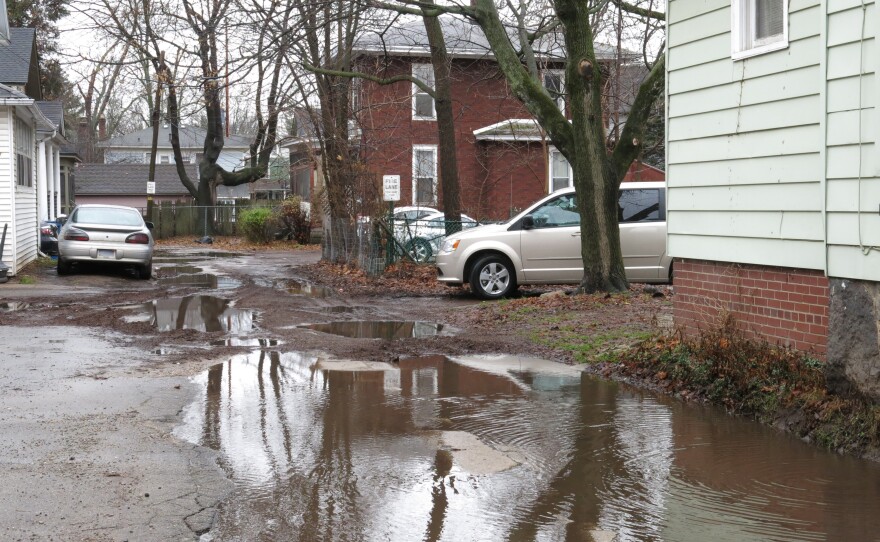In Kalamazoo’s Vine Neighborhood, houses don’t just line the streets. Many sit on the inside of the block. That reflects 100-plus years of people packing in to live near downtown and the school that’s now Western Michigan University.
Some of those homes lie on dead-end streets and alleys whose best days seem far behind them. But the city says it’s not responsible for their poor condition, because it doesn’t own them.
Vine isn’t the only neighborhood in Kalamazoo where private residential streets branch off of the public ones. But it might have the largest share – in central Vine you’ll hit one every few blocks. Some look great. Some look like they could use work. A few have all but disintegrated.
Vine Place, across Vine Street from Chenery Auditorium, is on the rougher end of the spectrum. After a heavy rain, the north end is more like a pond than a road. The surface is not potholed so much as cratered.
“It’s definitely fun trying to get in and out of in the winter once it’s just solid ice and anytime it rains, there’s just mud and water and you just have to drive slowly,” says Dana Cole, who has lived on Vine Place since the fall.
She says residents do their best to dig the drive out when it snows, but there’s only so much you can do without a plow.
“I kind of got from other people around here that you can park at the school across the street if it was really bad, if you didn’t want to get stuck back here all winter. Fortunately that wasn’t the case, it wasn’t as bad, but I can imagine last winter,” she says.
People can petition the city to make a street private. But records show that Vine Place was never public. It sprang up as an access road to houses inside the block.
At his office, Kalamazoo City Clerk Scott Borling turns pages in a map book from 1902.
“It’s so old that actually there are sections of the city that aren’t in here yet,” he says.
Borling doesn’t see Vine Place in the book. Nor does it show up in a map from the 1920s. It does appear on a 1932 map. But confusingly, it might not have existed then.
“The interesting thing about this map is that it would be amended – they would make changes to it – take paper and when there were changes, either parcels split or a new plat or something, they would just glue that page in over the old,” he says.
The last change was in the early 50s, so Vine Place was around by then. (A private street up the road was also once known as Vine Place. Now it has the same name as the public street that connects to it, West Vine Street. And previously, the street now known as Vine Place was sometimes known as Vine Court.)
The city lists more than 180 streets as private. Many serve mobile home parks, Western’s campus and commercial properties. And City Attorney Clyde Robinson says there’s no question that it’s not Kalamazoo’s job to maintain them.
“Public dollars shouldn’t be used to if you will improve or plow private roads. That’s the responsibility of the owners on the private road,” he says.
Robinson also says the city can’t force people to keep their private roads in good shape. That’s even though the city can fine people for shaggy lawns, garbage buildup or a trash can left on the curb. Robinson says the city simply doesn’t consider a chewed-up private street a threat to public well-being.
“If you want to let it descend into gravel, that’s your call,” he adds.
Robinson says Vine’s private streets are little more than “glorified driveways.” But Ratan Khatri disagrees. He manages the house on Vine Place where Dana Cole lives. He says the Place functions more like a street than a driveway. For one thing, you can’t park down the middle.
“Now that you have multiple homeowners using it, I don’t know how private it technically is – none of us can block each other from using it. So it’s not really a private drive in that sense – it’s only a private drive in the sense of the city does not have to plow it. And does not have to pave it or maintain it,” he says.
Khatri agrees that Vine Place is falling apart. He says it needs to be fixed. But he adds that the cost is too much for property owners to cover up-front.
“The owners that we purchased it from told us it was going to be somewhere between $30,000 and $50,000 to get that street – just put some asphalt on it, not even paving it. And I just don’t know how anybody could afford to do that,” he says.
Vine Place landlord John Prothro got a lower quote – around $15,000 to $20,000 to patch up the street – but says that’s still too high to pay on his own. Khatri says his ideal would be for the city to fix the street and let owners pay it back over time as an assessment.
He says he thinks it could happen if private street owners organized. But for now, he doesn’t have plans to launch that campaign.




